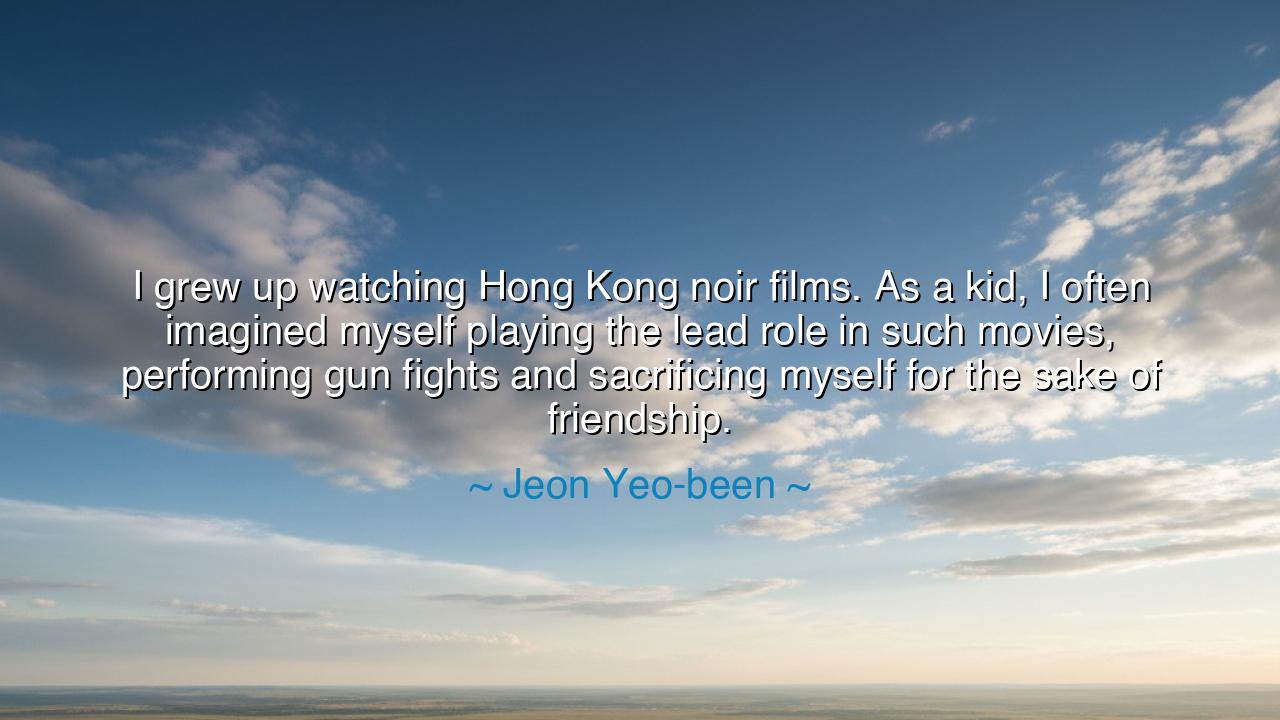
I grew up watching Hong Kong noir films. As a kid, I often
I grew up watching Hong Kong noir films. As a kid, I often imagined myself playing the lead role in such movies, performing gun fights and sacrificing myself for the sake of friendship.






The Korean actress Jeon Yeo-been, known for her emotional depth and fearless artistry, once said: “I grew up watching Hong Kong noir films. As a kid, I often imagined myself playing the lead role in such movies, performing gun fights and sacrificing myself for the sake of friendship.” In this confession lies more than nostalgia—it holds a glimpse into the soul of an artist, and a reflection on the timeless ideals of sacrifice, honor, and loyalty. Through the lens of cinema, Jeon speaks to the yearning in every human heart—to live with purpose, to fight for something greater than oneself, and to find beauty even in tragedy.
The meaning of her words stretches beyond childhood fantasy. The Hong Kong noir films of the 1980s and 1990s—works by masters like John Woo—were more than crime stories; they were operas of brotherhood and fate, where friendship was tested by bullets, and redemption was won through courage. To a young Jeon Yeo-been, these films were mirrors of the human condition, teaching that even amid violence and chaos, the soul can still choose loyalty over self-interest, and sacrifice over survival. The hero who falls for his friends is not merely dying—he is transcending, becoming a symbol of devotion that defies mortality.
In her imagination, Jeon found not just glamour or excitement, but a kind of moral code—one that speaks to the ancient ideal of heroic friendship. The ancients, too, told such tales: Achilles and Patroclus in Greece, who fought side by side until death; Guan Yu and his sworn brothers in China’s Romance of the Three Kingdoms, whose bond was bound by honor and blood. These stories echo through time, whispering the same truth that moved the young Jeon—that friendship is sacred when it demands courage, and that there is no nobler act than to give one’s life for love freely chosen.
Consider the story of Ahn Jung-geun, the Korean independence activist who sacrificed his life for his nation’s freedom in the early 20th century. Though his cause was political, his spirit was fraternal—he saw his fellow Koreans as brothers, his sacrifice as an act of friendship toward future generations. Like the noir heroes Jeon admired, Ahn believed that death for others is not loss, but legacy. It is this very sentiment—the intertwining of courage, love, and art—that breathes through her reflection.
At its core, Jeon’s quote also reveals the artist’s longing to embody truth through imagination. To perform the gun fights, to sacrifice for friendship—these were not mere fantasies of violence, but early signs of her desire to express what is profoundly human. In her words lies the heart of the performer’s craft: to live other lives so deeply that truth is revealed through illusion. Her fascination with such characters speaks to her own artistic calling—to explore the nobility of flawed souls, those who fall, fight, and bleed for something pure.
But there is also tenderness in her reflection—a recognition that friendship, even in fiction, carries sacred weight. The sacrifice for friendship that defines noir cinema is not only about death, but about trust, the willingness to stand beside another even when the world collapses. In an age that prizes ambition and independence, Jeon’s words remind us of the deeper power found in interdependence: that the human heart finds its greatest meaning not in victory, but in loyalty.
The lesson, then, is both artistic and moral. Cherish the friendships that demand something of you—those that call you to be braver, kinder, and truer than you were before. Do not fear the cost of loyalty, for in giving, you become whole. Let your life, like the stories that inspired Jeon, be one where courage and love are entwined, where the heart is willing to sacrifice comfort for connection, and ego for truth.
For in the end, as Jeon Yeo-been discovered through her childhood dreams, friendship is the most heroic act of all. It is the quiet battlefield where the soul proves its worth—not with gunfire, but with faith, compassion, and steadfast devotion. To live for others, to love without condition, and to remain loyal even in the face of loss—this is the truest form of greatness, the kind that outlives both art and time.






AAdministratorAdministrator
Welcome, honored guests. Please leave a comment, we will respond soon